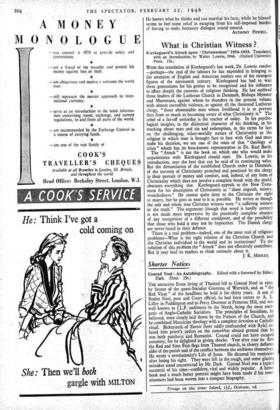What is Christian Witness ?
Wail this translation of Kierkegaard's last work, Dr. Lowrie reaches —perhaps—the end of the labours he has expended in bringing to the attention of English and American readers one of the strangest figures of the nineteenth century. Kierkegaard has had to wait three generations for his genius to be recognised and his influence to affect deeply the currents of religious thinking. He has outlived those leaders of the Lutheran Church in Denmark, Bishops Mynster and Martensen, against whom he thunders in the present volume with almost incredible violence, as against all the thousand Lutheran clergy, " those abominable men whose livelihood it is to prevent thee from so much as becoming aware of what Christianity is." The rebel of a far-off yesterday is the teacher of today. In his .psycho- logical insights, in the dialectical character of his thinking, in his teaching about man and sin and redemption, in the stress he lays on the challenging, other-worldly nature of Christianity as the religion in which man is brought face to face with God and must make his decision, we see one of the roots of that " theology of crisis " which has its best-known representative in Dr. Karl Barth.
The " Attack " is not the book on which one who would make acquaintance with Kierkegaard should start. Dr. Lowrie, in his introduction, says the best that can be said of its continuing value. But the denunciation of the established Church order in Denmark, of the travesty of Christianity preached and practised by the clergy in their pursuit of money and comfort, and, indeed, of any form of Christianity which does not involve a complete break with the world, obscures everything else. Kierkegaard appeals to the New Testa- ment for his description of Christianity as " sheer anguish, misery, wretchedness." He cannot quite deny to the Christian the right to marry, but he goes as near to it as possible. He writes as though the sole and whole true Christian witness were " a suffering witness to the truth." The argument (though that word is hardly correct) is not made more impressive by the practically complete absence of any recognition of a different standpoint, and of the possibility that those who hold it may not be hypocrites. The Danish clergy are never heard in their defence.
There is a real problem—indeed, one of the most real of religious problems—What is the right relation of the Christian Church and the Christian individual to the world and its institutions? To the solution of this problem the " Attack " does not effectively contribute. But it .may lead its readers to think seriously about it.
J. K. MOZLEY.






























 Previous page
Previous page